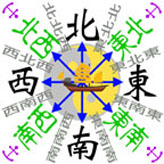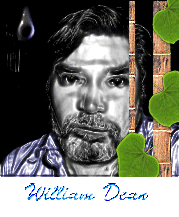
What Was I When?
by William Dean
Simple things. A rock. Running water. A straying leaf, wayward in
the wind. The old man walked along appreciating such things, not even aware, probably, of
the status of sensei, Zen Master. Like a struggling train up some distant hill, I
followed.
"What is the meaning? What am I supposed to be learning here?" My
mind kept asking, over and over. Droplet upon droplet of question marks. The Chinese
water torture, wearing down by slow degrees, until all questions are answered
truthfully.
We both were silent. Such was the rule. Don't ask, don't tell. I
always felt then that even before I'd opened my mouth, the wrong things would come out.
Okay, not come, but spill and spew like unwanted lava down my own useless slopes,
hardening eventually into some husk over me until all anyone would see would be this crusty
shell. There goes the lava field, they'd mutter: nothing growing there.
The old man sometimes paused in our walks. He'd pick up a small
pebble, his eyes
dancing over the small surfaces as if examining the corners and
reflections of a mirror.
Then, unerringly, he'd place the pebble back exactly where it had lain
before and move
on. I didn't dare pick it up. That would be copycatting.
"You are not me," he had said before. "I am not you. We are the same.
If I do a thing, do not do it because I have done it. Do it because you must. I am not
the path to follow, you are."
Dichotomy is impossible in Zen, of course. There are no opposites.
Not even what seems
irretrievably yin or yang escapes the undeniable "it is." At the very
end, it is. But
even my feeble attempts to grasp this essence, the old man would laugh
at.
"What end?" he would ask and keep laughing. "If you can know an end,
you have not
even begun the journey."
Western ideas. That was the problem. Linear thinking. Cause and
effect. Rules and
equations and the stuff of motion and progress. How can I get from
Point A (unZen) to
Point B (Zen)? It baffled me. It worried at me because, according to
the old man,
there
was no such thing as unZen. How could there be, when the Truth was
simply "Zen is."
I tried to logic my way around the insurmountable. Wait a minute. If
"Zen is," and
that's all there is, then I'm already there. I'm already enlightened.
I'm a Zen
Master, too, I just don't know it. Or accept it.
Right. Faith. Accept without questioning. Just be. And then
somewhere along the way,
it didn't matter where, I'd stumble. Catch my very physical foot on
some very physical
root of a tree or loose stone just waiting to trip me up. And, like a
special clockwork
automata, the old man would turn slowly, look at my foot and giggle.
"Questioning still?" he'd ask. The first few times, I'd answer.
"Well, I was
thinking..."
"No, not really, I was just, you know, trying to accept..."
He'd nod absently. "Thinking...trying. What are those?"
Like an idiot, I'd keep trying to answer him. "Well. Working things
out. I really
want to
learn."
"Working? Learning?"
Eventually, I did learn. I learned to keep my mouth shut. I still
stumbled sometimes,
but when he'd look back, I'd just shrug or smile. Then he'd nod and
continue walking. But
it's so hard to shut the mind off. "You're learning," it would taunt
me. My ego would
start to bloom up and my pulse race faster. I wanted to high five
myself, and then some contrasting thought would burn its way up -- like when an old film
catches fire and the image bursts into flame on the inner screen of the mind. "Shouldn't do
that. No ego. Wanting is the way of suffering," I'd remind myself. And then the pun
would grab my attention. Remind myself. Re-mind. That was what I needed to do. Or
was it un-mind?
I had to reach that promised nirvana, that sartori where there was no
mind, no me. Just Zen being Zen.
But how?
They say when you come to a wide river where there is no bridge, you
have to swim. The
other alternative requires the patience of a holy man: to sit down and
wait for the
river to dry up or change course. The Zen Master does none of these.
This was another
teaching of the old man.
"What then?" I asked.
He'd smile. "Perhaps you are already on the right side of the river?"
Back to the Chinese water torture. Questions answering questions until
all questioning
ceases. At this rate, I figured, I'd never understand Zen. "Why can't
you just give me
a straight answer?" I asked back, still caught in the loop.
"Very well," he said with another giggle. "No more questions. No more
answers." Don't
ask, don't tell. So our walks continued in silence.
Despite the immutability of "Zen being," the human flesh eventually
drops away from life
as we know it. The old man grew older, more feeble, died. A younger
man took his
place. Me.
I am what you pass by when you walk along. A leaf. A rock. Running
water. I am Zen.
I always was. Aren't you?
©2001 by William Dean



